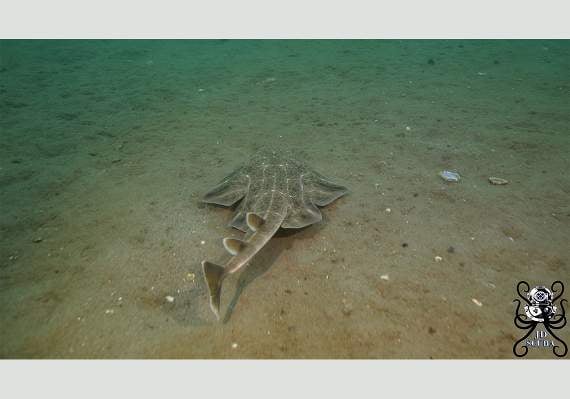A diver has managed to film underwater footage of one of the world’s rarest sharks in Cardigan Bay.
Filmed at the northern end of Cardigan Bay, this is the first time underwater photos and videos of the critically endangered angel shark have been taken in UK waters.
And because it is a juvenile, researchers say this provides clear-cut evidence the species is actively breeding and using Welsh waters to give birth.
The shark is listed as critically endangered on the IUCN Red List of Threatened species following a decline in their range over the last 50 years.
Numbers in the north-east Atlantic and the Mediterranean have fallen dramatically for the angel shark, a species that poses no threat to humans.
It’s only known stronghold is the Canary Islands.
The angel shark has a flat body, grey skin and can grow up to 1.8m in length and 80kg in weight.
Angel sharks are protected in Wales, through inclusion on both the Wildlife and Countryside Act and Environment (Wales) Act, and it is an offence to target or disturb this species.
Jake Davies, a photographer and marine biologist from Abersoch said: "I’ve always kept an eye out for angel sharks during dives, having worked to better understand the species for the last four years.
"I couldn’t believe it when I saw the angel shark, and what was really exciting was that it was a juvenile, just 30cm in length – providing further evidence that the species is giving birth in this area.
“It was incredible to watch and film it swimming, burying into the sand and then using its camouflage to ambush prey.
"This footage is far beyond what we thought would be possible to capture in Wales.”
Mr Davies is a co-ordinator for the Angel Shark Project: Wales (ASP:W), a collaborative project working with local communities and fishers to gather records on the species.
Joanna Barker, co-founder of the Angel Shark Project said: “This footage supports our hypothesis that angel sharks give birth in waters around Wales.
"The size (30cm) and white markings on the dorsal fin edges show the angel shark was born this year, confirming we have an active breeding population in Wales.
“This new footage is extremely useful to inform our conservation efforts for this species, especially as Wales hosts one of the last angel shark populations in the northern most part of their range.”
Marine ecologist Ben Wray added: “Little is known about the status, ecology or location of important habitats for angel sharks in Wales.
"Only four per cent of angel shark records gathered by ASP:W to date are of juveniles, so this footage is extremely important.
"It builds our understanding of angel shark ecology, including that they use both sand and mixed habitats and that the juveniles prey on gobies.
"We will use this evidence to help plan future research and discover more about this rare species in Wales.”





Comments
This article has no comments yet. Be the first to leave a comment.